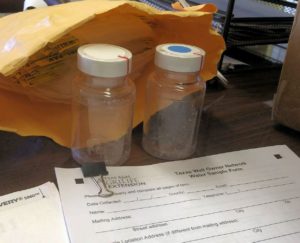Source: today.agrilife.org
The Texas Well Owner Network will provide water well screenings for residents in Andrews, Gaines, Howard and Martin counties during October. The Well Informed screenings are provided by the Texas A&M AgriLife Extension Service offices in the counties in collaboration with the Texas Water Resources Institute.
Each screening event will be from 8:30-10 a.m. Dates and locations for the screenings, as well as dates, times and locations for follow-ups are:
– Oct. 21 at the AgriLife Extension office for Andrews County, 851 E. Broadway St., Andrews. A meeting explaining screening results will be at 6:30 p.m. Oct. 22 at the Andrews Community Building, 200 N.W. Mustang Drive.
– Oct. 21 at the AgriLife Extension office for Gaines County, 101 S. Main St., Courthouse, Room 108, Seminole. A meeting explaining screening results will be at 6:30 p.m. Oct. 22 at the Andrews Community Building, 200 N.W. Mustang Drive in Andrews.
– Oct. 22 at the AgriLife Extension office for Howard County, 2411 Echols Drive, Big Spring.A meeting explaining screening results will be at 5 p.m. Oct. 23 at the same location.
– Oct. 22 at the AgriLife Extension office for Martin County, 210 Convent St., Stanton. A meeting explaining screening results will be at 2 p.m. Oct. 23 at the same location.
The cost is $10 per sample and samples must be turned in by 10 a.m. on the day of the screening. Arsenic screening will be available for drinking water for an additional $10.
“Private water wells should be tested annually,” said John Smith, AgriLife Extension program specialist, College Station.
Smith said area residents wanting to have their well water screened should pick up a sample bag, bottle and instructions from the AgriLife Extension office in their county.
“It is very important that only sampling bags and bottles from the AgriLife Extension office be used and all instructions for proper sampling are followed to ensure accurate results,” he said.
Samples will be screened for contaminants, including total coliform bacteria, E. coli, nitrate-nitrogen, arsenic and salinity.
Smith said research shows the presence of E. coli bacteria in water indicates waste from humans or warm-blooded animals may have contaminated the water. Water contaminated with E. coli is more likely to also have pathogens present that can cause diarrhea, cramps, nausea or other symptoms.
“Water with nitrate-nitrogen at levels of 10 parts per million is considered unsafe for human consumption,” Smith said. “These nitrate levels above 10 parts per million can disrupt the ability of blood to carry oxygen throughout the body, resulting in a condition called methemoglobinemia. Infants less than 6 months of age and young livestock are most susceptible.”
Salinity, as measured by total dissolved solids, will also be determined for each sample, he said. Water with high levels may leave deposits and have a salty taste, and using water with high levels for irrigation may damage soil or plants.
Smith said long-term consumption of arsenic in water increases the risk of skin cancer and cancer in the liver, bladder and lungs. In addition, chronic exposure to arsenic may lead to gastrointestinal irritation and cardiovascular disease.
Smith said it is extremely important for those submitting samples to be at the follow-up meetings to receive results, learn corrective measures for identified problems and improve their understanding of private well management.
For more information for the Andrews County screening, call 432-524-1421; for the Gaines County screening, 432-758-4006; for the Howard County screening, 432-264-2236; and for the Martin County screening, 432-756-3316.
To learn more about programs offered through the Texas Well Owner Network or to find additional publications and resources, go to http://twon.tamu.edu.
Funding for the Texas Well Owner Network is through a Clean Water Act nonpoint source grant provided by the Texas State Soil and Water Conservation Board and the U.S. Environmental Protection Agency. The project is managed by TWRI, part of Texas A&M AgriLife Research, AgriLife Extension and the College of Agriculture and Life Sciences at Texas A&M University.

